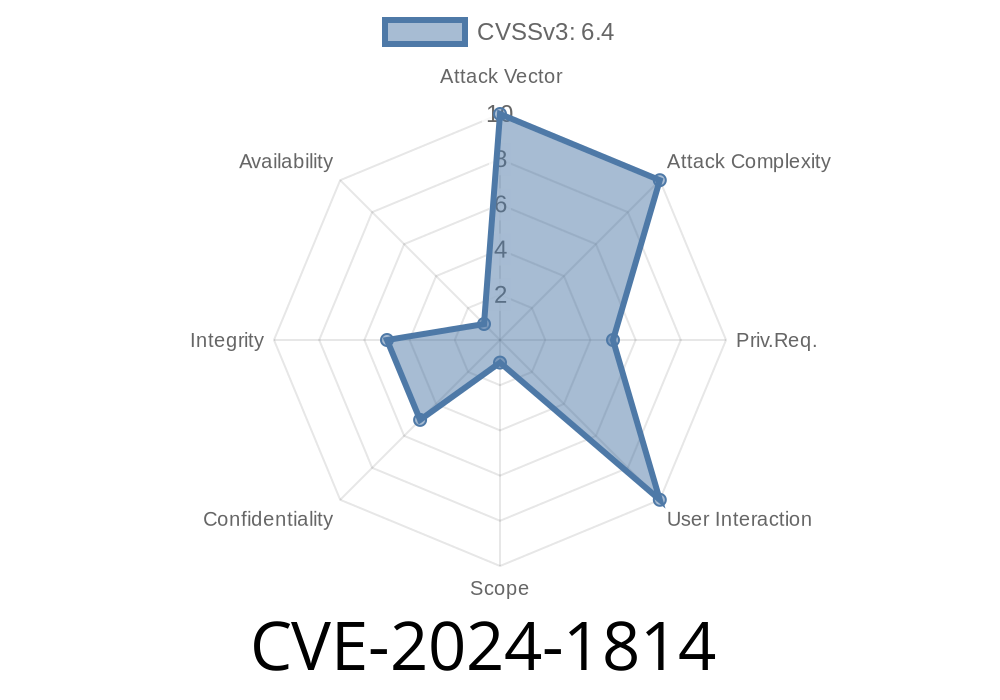WordPress is the engine behind millions of websites, and its plugins like Spectra (formerly called Ultimate Addons for Gutenberg) help users create rich pages without coding. But what happens when such a plugin opens the door for hackers? This post breaks down CVE-2024-1814, a big vulnerability in the Spectra plugin, reveals the exploit, and shows what you should do.
What is CVE-2024-1814?
CVE-2024-1814 is a security flaw affecting the Spectra – WordPress Gutenberg Blocks plugin (all versions up to and including 2.12.8). This plugin lets users add beautiful blocks to WordPress pages, such as testimonials, team members, calls to action, and more.
The problem is with the Testimonial block. Due to “insufficient input sanitization and output escaping,” attackers can inject malicious code (“stored cross-site scripting” or XSS) that runs in your browser when you visit an affected page.
Official References
- Wordfence Advisory
- NVD Entry
- Spectra on WordPress.org
- Spectra GitHub
Who can attack?
- Anyone with at least “Contributor” rights on your WordPress site (including subscribers promoted to contributor, or an attacker with stolen credentials).
How is the attack performed?
- They insert a specially crafted “Testimonial” block, but instead of normal text like “Great product!”, they insert JavaScript code or other malicious input in fields like “Author Name” or “Testimonial Content”.
What is the result?
- That malicious code gets saved in the page/post content.
- When an administrator or visitor with higher privileges views the page, the injected code runs in *their* browser, possibly stealing logins, cookies, or doing other harmful things.
Step-by-Step Exploit Example
Here’s how someone could exploit this, assuming they have contributor access (the lowest privilege able to publish content):
1. Add a New Page or Post
The attacker goes to Posts > Add New and inserts the Testimonial block.
Normally, a user adds safe text
[testimonial name="Jane Doe" content="Great plugin!"]
But the attacker instead writes
[testimonial name='<img src=x onerror="alert(document.cookie)">' content="Awesome!"]
Or, in Gutenberg’s visual editor, they might just write this in the “Name” field
<img src=x onerror="alert('XSS!')">
3. Publish the Post
With contributor access, they publish it. WordPress and Spectra fail to properly clean (sanitize) and encode (escape) these attributes.
4. Victim Views the Page
When anyone visits that page, the attack happens. For example, a logged-in admin views the post, and a popup pops up with their cookies. Hackers could change the script to steal those cookies or perform other attacks.
Here's what a simplified vulnerable code snippet might look like in PHP/React
// PHP: Rendering the Testimonial block (hypothetical simplified version)
echo '<div class="testimonial">';
echo '<span class="testimonial-author">' . $_POST['testimonial_name'] . '</span>';
echo '<div class="testimonial-content">' . $_POST['testimonial_content'] . '</div>';
echo '</div>';
What’s wrong?
- $_POST['testimonial_name'] and $_POST['testimonial_content'] are output directly, *unescaped*. No esc_html() or similar.
UPDATE to Spectra v2.12.9 or later (available since January 2024).
Remove any untrusted users with contributor access.
- Audit your pages/posts that use Testimonial blocks for suspicious code.
- Use a WAF (Web Application Firewall) like Wordfence to block attempted exploits.
Conclusion
CVE-2024-1814 is a classic example of how even a small input sanitization slip can put entire WordPress sites at risk. The good news? If you keep your plugins updated and limit user roles carefully, you can avoid trouble.
More Reading
- Understanding Stored XSS Attacks
- How WordPress Escaping Works
- CVE-2024-1814 at NVD
> Stay safe, patch often, and keep an eye on your WordPress plugins!
Timeline
Published on: 05/23/2024 11:15:23 UTC
Last modified on: 06/04/2024 18:00:44 UTC
